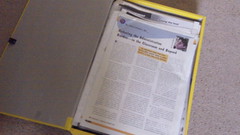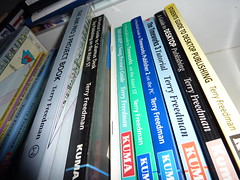 They say that time is money, and this is certainly true for the professional writer. If you’re billing a client according to the amount of time spent on the project, you’ll need to keep an accurate record of that. You could use a spreadsheet, which certainly has its advantages, but the beauty of Taskcoach is that it will actually record the precise amount of time you clock up – as long as you remember to set it going when you start work!
They say that time is money, and this is certainly true for the professional writer. If you’re billing a client according to the amount of time spent on the project, you’ll need to keep an accurate record of that. You could use a spreadsheet, which certainly has its advantages, but the beauty of Taskcoach is that it will actually record the precise amount of time you clock up – as long as you remember to set it going when you start work!
Professional writer
8 Rules for writers
 Here is a set of rules that I hope you will find useful. The way I see it, readers’ time is far too precious to waste. People are made to feel guilty, or have somehow been conditioned to feel guilty, if they don't read every possibly useful report. Or every relevant newspaper article. But as writers, or content producers, we have a responsibility too. Here are some rules which I am gradually starting to live by myself.
Here is a set of rules that I hope you will find useful. The way I see it, readers’ time is far too precious to waste. People are made to feel guilty, or have somehow been conditioned to feel guilty, if they don't read every possibly useful report. Or every relevant newspaper article. But as writers, or content producers, we have a responsibility too. Here are some rules which I am gradually starting to live by myself.
The value of clippings
 I feel a bit like the first person in Khalil Gibran’s story of The Gravedigger. It’s taken me years and years, but I am finally getting rid of boxes and boxes of my clippings, ie the articles I’ve had published.
I feel a bit like the first person in Khalil Gibran’s story of The Gravedigger. It’s taken me years and years, but I am finally getting rid of boxes and boxes of my clippings, ie the articles I’ve had published.
This is not out of necessity, even though they do take up a fair bit of room in our loft. It’s just that I’ve decided I don’t need them any more, which made me think: why does anyone need to keep their clippings?
I think there are three main reasons.
How to store clippings
 How do you keep your clippings?
How do you keep your clippings?
If you keep them in paper format, they take up more and more room as your portfolio grows. If you keep them in boxes in the loft, as I do, you never get to see them anyway. I think if you’re going to store them in printed format you should go the whole hog and keep them nicely bound in some sort of presentation folder, and place them on shelves in your living space so that they can be admired by you and anyone who happens to browse your bookshelves!
The future of journalism
Some of my reference books
 Just because I love technology and spend a lot of time on the web, and writing for the web, doesn’t mean I’ve eschewed books. I still use books extensively (and intensively) for my writing. Not any books either, but ones written or contributed to by experts.
Just because I love technology and spend a lot of time on the web, and writing for the web, doesn’t mean I’ve eschewed books. I still use books extensively (and intensively) for my writing. Not any books either, but ones written or contributed to by experts.
I think if you’re serious about writing you don’t want to be messing about with so-called “crowd-sourced” information, which may or may not be correct.
Top tips from a self-publisher
Bad headlines
If there’s one thing that really annoys me it’s chapter headings and article headlines where you can’t tell what the subject matter is until you read it. Who needs a situation in which you don’t know if you want to read something until you have read it? The way I look at it is that if the author can’t even be bothered being clear when he’s trying to entice you to read his stuff, why should you be bothered to oblige him by reading it?
4 Reasons to get published
 It's important to be published by a traditional publisher
It's important to be published by a traditional publisher
Image by Terry Freedman via Flickr
In this day and age, in which anyone can publish and distribute their books electronically, or self-publish them by going down several routes (none of which need include the traditional vanity publisher), why should anyone bother approaching a traditional publisher? After all, very few of the thousands of manuscripts that publishers receive find their way into book form, and of those that do, very few hit the big time. There are, in fact, at least 4 reasons to try to get published by the age-old process of going to publishers.
10 attributes of professional writers -- #10: Ask for permission to quote
 It’s always a good idea to ask permission to quote someone, especially if you’re (slightly) putting words into their mouths. “How might that arise?”, you might ask.
It’s always a good idea to ask permission to quote someone, especially if you’re (slightly) putting words into their mouths. “How might that arise?”, you might ask.
10 attributes of professional writers -- #9: Keep a record of sources
 If you’re doing research for an article, it’s easy to lose track of where you came across information, such as useful quotes you can use. This is where an electronic aide can come in very handy.
If you’re doing research for an article, it’s easy to lose track of where you came across information, such as useful quotes you can use. This is where an electronic aide can come in very handy.
Two tools you might consider using are:
10 attributes of professional writers -- #8: Pitch to the right outlet
10 attributes of professional writers -- #7: Research properly
 Can there be any excuse, in this day and age, for poorly-researched material? There are books, the internet and still, even in these straitened times, public libraries with reference sections.
Can there be any excuse, in this day and age, for poorly-researched material? There are books, the internet and still, even in these straitened times, public libraries with reference sections.
Self-publishing
 Although I have had many books published by traditional publishers, I like self-publishing. I like it because it is great for niche topics. However, it is most decidedly not an unequivocally good thing, and there are pros and cons of each approach. This video summarises the issues.
Although I have had many books published by traditional publishers, I like self-publishing. I like it because it is great for niche topics. However, it is most decidedly not an unequivocally good thing, and there are pros and cons of each approach. This video summarises the issues.
10 attributes of professional writers -- #6: Proofread properly
Last year a teenager sent me an article with a covering email saying:
Sorry, I didn’t have time to proofread it properly. Sure you can sort it out!
Tools For the Writer
10 attributes of professional writers -- #5: Send professional emails
 Email is a marvellous facility. especially for pitching editors or publishers, and for sending a covering “letter” with an article or story. However, there is an inherent danger of its tempting us into being too casual.
Email is a marvellous facility. especially for pitching editors or publishers, and for sending a covering “letter” with an article or story. However, there is an inherent danger of its tempting us into being too casual.
Here are “Terry’s Top Seven Tips for professional-looking emails”.